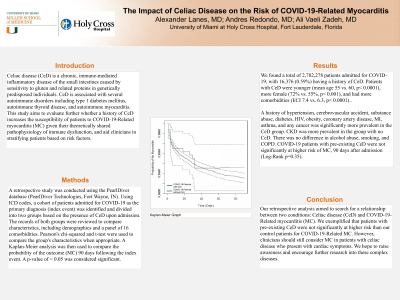Tuesday Poster Session
Category: Small Intestine
P4104 - The Impact of Celiac Disease on the Risk of COVID-19-Related Myocarditis
Tuesday, October 24, 2023
10:30 AM - 4:00 PM PT
Location: Exhibit Hall

Has Audio

Alexander Lanes, MD
University of Miami at Holy Cross Hospital
Fort Lauderdale, FL
Presenting Author(s)
Alexander Lanes, MD1, Andres Redondo, MD2, Ali Vaeli Zadeh, MD3
1University of Miami at Holy Cross Hospital, Fort Lauderdale, FL; 2University of Miami, Holy Cross Hospital, Fort Lauderdale, FL; 3University of Miami Holy Cross Hospital, Fort Lauderdale, FL
Introduction: Celiac disease (CeD) is a chronic, immune-mediated inflammatory disease of the small intestines caused by sensitivity to gluten and related proteins in genetically predisposed individuals. CeD is associated with several autoimmune disorders including type 1 diabetes mellitus, autoimmune thyroid disease, and autoimmune myocarditis. This study aims to evaluate further whether a history of CeD increases the susceptibility of patients to COVID-19-Related myocarditis (MC) given their theoretically shared pathophysiology of immune dysfunction, and aid clinicians in stratifying patients based on risk factors.
Methods: A retrospective study was conducted using the PearlDiver database (PearlDiver Technologies, Fort Wayne, IN). Using ICD codes, a cohort of patients admitted for COVID-19 as the primary diagnosis (index event) was identified and divided into two groups based on the presence of CeD upon admission. The records of both groups were reviewed to compare characteristics, including demographics and a panel of 16 comorbidities. Pearson's chi-squared and t-test were used to compare the group's characteristics when appropriate. A Kaplan-Meier analysis was then used to compare the probability of the outcome (MC) 90 days following the index event. A p-value of < 0.05 was considered significant.
Results: We found a total of 2,782,278 patients admitted for COVID-19, with 16,376 (0.59%) having a history of CeD. Patients with CeD were younger (mean age 55 vs. 60, p< 0.0001), more female (72% vs. 55%, p< 0.001), and had more comorbidities (ECI* 7.4 vs. 6.3, p< 0.0001). A history of hypertension, cerebrovascular accident, substance abuse, diabetes, HIV, obesity, coronary artery disease, MI, asthma, and any cancer was significantly more prevalent in the CeD group. CKD was more prevalent in the group with no CeD. There was no difference in alcohol abuse, smoking, and COPD. COVID-19 patients with pre-existing CeD were not significantly at higher risk of MC, 90 days after admission (Log-Rank p=0.35)
*ECI= Elixhauser Comorbidity Index
Discussion: Our retrospective analysis aimed to search for a relationship between two conditions: Celiac disease and COVID-19-Related myocarditis. We exemplified that patients with pre-existing CeD were not significantly at higher risk than our control patients for MC. However, clinicians should still consider MC in patients with celiac disease who present with cardiac symptoms. We hope to raise awareness and encourage further research into these complex diseases.
Disclosures:
Alexander Lanes, MD1, Andres Redondo, MD2, Ali Vaeli Zadeh, MD3. P4104 - The Impact of Celiac Disease on the Risk of COVID-19-Related Myocarditis, ACG 2023 Annual Scientific Meeting Abstracts. Vancouver, BC, Canada: American College of Gastroenterology.
1University of Miami at Holy Cross Hospital, Fort Lauderdale, FL; 2University of Miami, Holy Cross Hospital, Fort Lauderdale, FL; 3University of Miami Holy Cross Hospital, Fort Lauderdale, FL
Introduction: Celiac disease (CeD) is a chronic, immune-mediated inflammatory disease of the small intestines caused by sensitivity to gluten and related proteins in genetically predisposed individuals. CeD is associated with several autoimmune disorders including type 1 diabetes mellitus, autoimmune thyroid disease, and autoimmune myocarditis. This study aims to evaluate further whether a history of CeD increases the susceptibility of patients to COVID-19-Related myocarditis (MC) given their theoretically shared pathophysiology of immune dysfunction, and aid clinicians in stratifying patients based on risk factors.
Methods: A retrospective study was conducted using the PearlDiver database (PearlDiver Technologies, Fort Wayne, IN). Using ICD codes, a cohort of patients admitted for COVID-19 as the primary diagnosis (index event) was identified and divided into two groups based on the presence of CeD upon admission. The records of both groups were reviewed to compare characteristics, including demographics and a panel of 16 comorbidities. Pearson's chi-squared and t-test were used to compare the group's characteristics when appropriate. A Kaplan-Meier analysis was then used to compare the probability of the outcome (MC) 90 days following the index event. A p-value of < 0.05 was considered significant.
Results: We found a total of 2,782,278 patients admitted for COVID-19, with 16,376 (0.59%) having a history of CeD. Patients with CeD were younger (mean age 55 vs. 60, p< 0.0001), more female (72% vs. 55%, p< 0.001), and had more comorbidities (ECI* 7.4 vs. 6.3, p< 0.0001). A history of hypertension, cerebrovascular accident, substance abuse, diabetes, HIV, obesity, coronary artery disease, MI, asthma, and any cancer was significantly more prevalent in the CeD group. CKD was more prevalent in the group with no CeD. There was no difference in alcohol abuse, smoking, and COPD. COVID-19 patients with pre-existing CeD were not significantly at higher risk of MC, 90 days after admission (Log-Rank p=0.35)
*ECI= Elixhauser Comorbidity Index
Discussion: Our retrospective analysis aimed to search for a relationship between two conditions: Celiac disease and COVID-19-Related myocarditis. We exemplified that patients with pre-existing CeD were not significantly at higher risk than our control patients for MC. However, clinicians should still consider MC in patients with celiac disease who present with cardiac symptoms. We hope to raise awareness and encourage further research into these complex diseases.
Disclosures:
Alexander Lanes indicated no relevant financial relationships.
Andres Redondo indicated no relevant financial relationships.
Ali Vaeli Zadeh indicated no relevant financial relationships.
Alexander Lanes, MD1, Andres Redondo, MD2, Ali Vaeli Zadeh, MD3. P4104 - The Impact of Celiac Disease on the Risk of COVID-19-Related Myocarditis, ACG 2023 Annual Scientific Meeting Abstracts. Vancouver, BC, Canada: American College of Gastroenterology.
